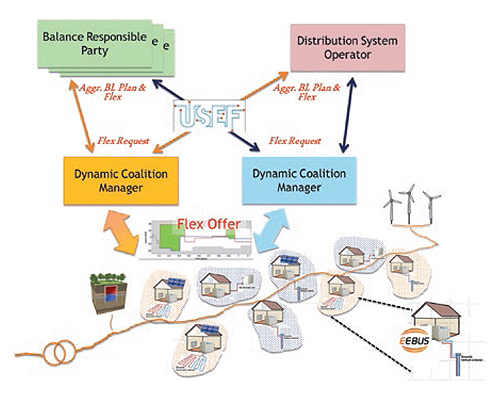 Dynamic Coalitions of distribution grid connected Power
to Heat resources providing local and system level services.
Dynamic Coalitions of distribution grid connected Power
to Heat resources providing local and system level services.
The FHP – Flexible Heat and Power project develops a
standards-based multi-stakeholder multi-agent platform
that enables the trading of flexibility provided by Heat
Pumps. The focus is on heat pumps in buildings (residential,
commercial, industrial), as well as heat pumps associated
with a district level – seasonal – heat storage solution
provided by ECOVAT. The prime selected business use
cases relate to the mitigation of local and system level
RES curtailment which is undesirable from societal and
environmental point of view, and forms a barrier for
increased RES investments. But the developed platform is
capable of supporting other business use cases as well, both
in the Day-Ahead /Intra-Day and the real-time time frame.
The work in the project is organized around four pillars.
Pillar 1: Dynamic Coalition Manager at the heart of a
standard-based Multi-Agent System
The Dynamic Coalition Manager is a specialization of the
aggregator role. It performs location aware aggregation
of Power-to-Heat flexibility provided by buildings and the
ECOVAT, and offers this to the DSO for local technical
RES curtailment mitigation, or the BRP for economic RES
curtailment mitigation. There is a bi-directional information
exchange with the flex providers: the latter provide
information on their optimal baseline consumption plan and
available flex with expected activation cost, and the former
communicates the activation decision which is a plan for the
next n timesteps. The pool of resources that can be used
by the DCM is dynamic, i.e. flex providers can decide freely
when and to whom (if there are multiple DCMs) they offer
their flex.
Pillar 2: Human expert-free multi-zone modelling of
dynamic thermal behaviour
To determine the optimal baseline consumption pattern as
well as the available flexibility, a combination of grey-box
thermal modelling with machine-learning and optimization
algorithms is used. Specifically, a methodology is
developed that creates high quality multi-zone models that
learn the amount of relevant zones, their adjacency and their
relevant parameters in an automated data driven manner
without requiring human expert intervention. This will
provide a replicable solution that can be easily deployed.
Pillar 3: Optimal flex dispatch solution
Based on forecasts of load and (RES) generation, and a
local grid model, the DSO performs an analysis on whether,
where and when local grid problems can be expected. This
results in a flex request formulation towards the Dynamic
Coalition Manager. This flex request contains information
on the minimal required flex activations (e.g. load shifting)
that are needed to prevent the forecasted problem, as well
as constraints for the acceptable load shifting solutions.
The Dynamic Coalition Manager(s) determine an optimal
flex dispatching plan for each of its available flex resources
that adheres to the flex request, using information on the
available flexibility and cost of activation of its current
dynamic coalition.
Pillar 4: Grid Flexible Heatpump
Currently heatpumps are primarily designed for efficiency,
not for offering flexibility services. Using them for flexibility
services typically is done in an indirect manner, forcing them
into a certain power consumption regime based on their
heating curves and sensor overrides. In the FHP project
we explore and prototype ways to control heatpumps in a
direct manner in relation to the desired consumption profi le.
Besides, we will analyse how to increase their flexible
operation without impacting their lifetime or safety.

Contact Details:
Web Page: www.fhp-h2020.eu
E-mail: chris.caerts@vito.be
This project has received funding from the European Union's Horizon 2020 research and innovation programme under grant agreement No 731231